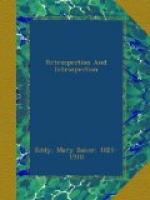In those days preaching and teaching were substantially one. There was no church preaching, in the modern sense of the term. Men assembled in the one temple (at Jerusalem) for sacrificial ceremonies, not for sermons. Into the synagogues, scattered about in cities and villages, they went for liturgical worship, and instruction in the Mosaic law. If one worshipper preached to the others, he did so informally, and because he was bidden to this privileged duty at that particular moment. It was the custom to pay this hortatory compliment to a stranger, or to a member who had been away from the neighborhood; as Jesus was once asked to exhort, when he had been some time absent from Nazareth but once again entered the synagogue which he had frequented in childhood.
Jesus’ method was to instruct his own students; and he watched and guarded them unto the end, even according to his promise, “Lo, I am with you alway!” Nowhere in the four Gospels will Christian Scientists find any precedent for employing another student to take charge of their students, or for neglecting their own students, in order to enlarge their sphere of action.
Above all, trespass not intentionally upon other people’s thoughts, by endeavoring to influence other minds to any action not first made known to them or sought by them. Corporeal and selfish influence is human, fallible, and temporary; but incorporeal impulsion is divine, infallible, and eternal. The student should be most careful not to thrust aside Science, and shade God’s window which lets in light, or seek to stand in God’s stead.
Does the faithful shepherd forsake the lambs,—retaining his salary for tending the home flock while he is serving another fold? There is no evidence to show that Jesus ever entered the towns whither he sent his disciples; no evidence that he there taught a few hungry ones, and then left them to starve or to stray. To these selected ones (like “the elect lady” to whom St. John addressed one of his epistles) he gave personal instruction, and gave in plain words, until they were able to fulfil his behest and depart on their united pilgrimages. This he did, even though one of the twelve whom he kept near himself betrayed him, and others forsook him.
The true mother never willingly neglects her children in their early and sacred hours, consigning them to the care of nurse or stranger. Who can feel and comprehend the needs of her babe like the ardent mother? What other heart yearns with her solicitude, endures with her patience, waits with her hope, and labors with her love, to promote the welfare and happiness of her children? Thus must the Mother in Israel give all her hours to those first sacred tasks, till her children can walk steadfastly in wisdom’s ways.
One of my students wrote to me: “I believe the proper thing for us to do is to follow, as nearly as we can, in the path you have pursued!” It is gladdening to find, in such a student, one of the children of light. It is safe to leave with God the government of man. He appoints and He anoints His Truth-bearers, and God is their sure defense and refuge.




